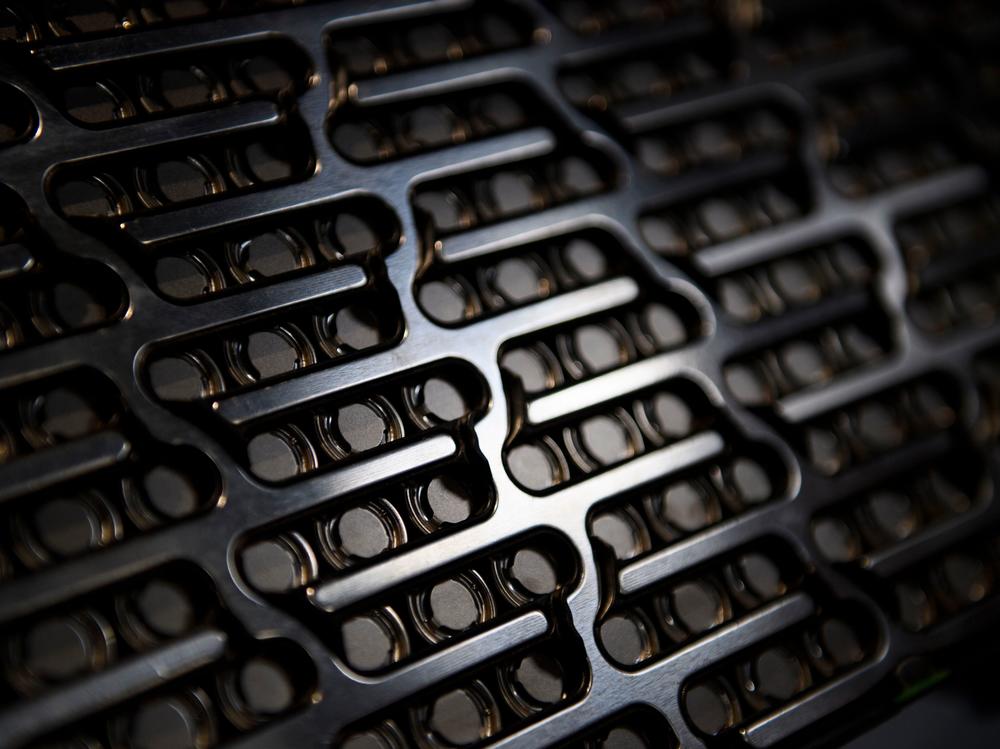Section Branding
Header Content
As Auto Industry Goes Electric, Can It Avoid A Battery Bottleneck?
Primary Content
The world is going to need more batteries. A lot more batteries.
Every major automaker is preparing to pivot from gas and diesel cars to electric and hybrid ones. Ford F-150s and Kia crossovers, Volkswagen hatchbacks and BMW sedans: They'll all plug in instead of fill up. It's a remarkable transformation that will change the way we drive and shake up world energy markets.
But the massive shift is raising concern that the world's battery supply chain, from mines to manufacturers, will fail to keep pace, leading to a bottleneck that will slow the pace of electrification and derail companies' business plans — and the fight against climate change.
These fears are coming as the global auto industry is already reeling from supply shortages, most notably of semiconductors, that have delayed the production of an estimated million vehicles and cut into billions of dollars of automaker profits.
A future battery shortage could be even more of a nightmare.
"In a conservative scenario, we expect lithium-ion battery demand to increase at least tenfold between 2020 and 2030," says Logan Goldie-Scot, the head of clean power research at BloombergNEF.
The battery market is already tight, according to Goldie-Scot. It's not a catastrophic shortage by any stretch, but there's not a lot of extra supply either.
Tesla CEO Elon Musk has blamed battery supplies for delays in production of the Tesla Semi, a battery-powered tractor trailer.
And battery demand is only starting to rise. General Motors and Volvo have pledged to give up gas-powered cars completely in just 15 years or even less, and President Biden wants to push the industry as a whole to accelerate its transition.
So battery supplies will need to scale up fast — starting with the raw materials that go into them.
Minerals such as lithium, nickel and cobalt are the key components for the rechargeable batteries that power our phones, computers and electric vehicles.
These minerals aren't particularly scarce: The fear of a shortage is not tied to anxiety about literally running low on Earth's supply of lithium, for instance.
But it takes time to scale up a mining operation. And there's fierce debate about just when electric vehicles will dominate auto production. According to a new report from KPMG, analysts' estimates for what percentage of vehicles will be exclusively battery powered by 2030 "range from as little as 24 percent to nearly 40 percent."
That uncertainty makes it harder for participants in the battery supply chain to determine how aggressively they should scale up. Betting wrong can be extremely expensive.
In fact, a few years ago, lithium miners anticipated huge growth in electric-vehicle battery demand and expanded quickly — but the expected boom didn't come. Lithium prices collapsed.
"One of the battery suppliers might be thinking, 'Hey, I'm not going to invest in making a million gigawatt-hours of battery pack, because what if your predictions don't come to pass?' " says Ram Chandrasekaran, head of transportation and mobility at consulting firm Wood Mackenzie.
Car companies, worried that such doubts might slow the pace of investment, are getting creative. They're tweaking battery chemistry, investing in battery production and setting up new partnerships.
BMW and Volkswagen have even announced contracts with mining companies to buy lithium directly for years to come. That's unusual because most major automakers — with the notable exception of Tesla — have typically relied on their suppliers to source raw materials for batteries.
"Increasingly, I think there's a fear amongst car companies and battery companies that they won't be able to get sufficient raw materials," says Keith Phillips, the CEO of Piedmont Lithium. "So they're reaching back and looking to procure the raw material on their own."
His own company, which is looking to mine and process lithium in the United States, has had conversations with "everyone in the supply chain," he says, a sign of how widespread the concern is around securing future supply.
Phillips thinks this is different from the short-lived lithium boom a few years ago. Now, he says, automakers are not just predicting an electric future but committing real resources to it. The Biden administration is also extremely interested in both boosting electric vehicle demand and incentivizing domestic supply chains. The White House wants to reduce reliance on other countries, particularly China.
Chandrasekaran, of Wood Mackenzie, says this is an arms race between countries and a power play between suppliers and automakers, in addition to an industrywide battle against a potential bottleneck. It has thrown some long-standing industry dynamics into upheaval.
"I think coming out of 2020, we used 'unprecedented' an unprecedented amount of times," he says. "But that's what we're seeing here as well."
Copyright 2021 NPR. To see more, visit https://www.npr.org.

